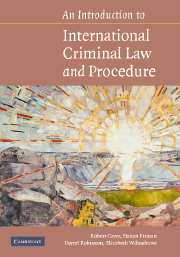Book contents
- Frontmatter
- Contents
- Preface
- Table of Cases
- Table of Treaties
- Table of Abbreviations
- Part A Introduction
- Part B Prosecutions in National Courts
- Part C International Prosecutions
- Part D Substantive Law of International Crimes
- Part E Principles and Procedures of International Prosecutions
- 15 General Principles of Liability
- 16 Defences/Grounds for Excluding Criminal Responsibility
- 17 Procedures of International Criminal Investigations and Prosecutions
- 18 Sentencing, Penalties and Reparations to Victims
- Part F Relationship Between National and International Systems
- Index
- References
18 - Sentencing, Penalties and Reparations to Victims
- Frontmatter
- Contents
- Preface
- Table of Cases
- Table of Treaties
- Table of Abbreviations
- Part A Introduction
- Part B Prosecutions in National Courts
- Part C International Prosecutions
- Part D Substantive Law of International Crimes
- Part E Principles and Procedures of International Prosecutions
- 15 General Principles of Liability
- 16 Defences/Grounds for Excluding Criminal Responsibility
- 17 Procedures of International Criminal Investigations and Prosecutions
- 18 Sentencing, Penalties and Reparations to Victims
- Part F Relationship Between National and International Systems
- Index
- References
Summary
International punishment of crimes
International humanitarian law and criminal law treaties provide for individual criminal responsibility for certain violations, but they give virtually no guidance as to applicable penalties or other sentencing issues. For example, the Genocide Convention merely provides that penalties shall be ‘effective’ and the Torture Convention that the penalties shall be ‘appropriate’ and take into account the ‘grave nature’ of the offence. However, the principle of legality includes a prohibition against retroactive creation of punishments (nulla poena sine lege) and for that reason an international criminal jurisdiction regulation is required; an effort that is fraught with difficulties since States take very different views on penalties. Consequently, international provisions on penalties and sentencing are rather general, leaving a tribunal with wide discretion, again triggering concerns regarding the legality principle.
The Nuremberg and Tokyo Tribunals had the power to impose ‘death or such other punishment as shall be determined by it to be just’. At Nuremberg, twelve of the accused were sentenced to death (by hanging), three to life imprisonment and four to fixed-term prison sentences. The Tokyo trial produced seven sentences of death, eleven of life imprisonment and two of fixed-term imprisonment. The national military tribunals operating in Germany (under Control Council Law No. 10) and in the Far East had the same sentencing powers. To dispel concerns about retroactivity, the penalties were considered rooted in customary international law. None of these Tribunals developed sentencing guidelines of use for later Tribunals.
- Type
- Chapter
- Information
- An Introduction to International Criminal Law and Procedure , pp. 393 - 404Publisher: Cambridge University PressPrint publication year: 2007



